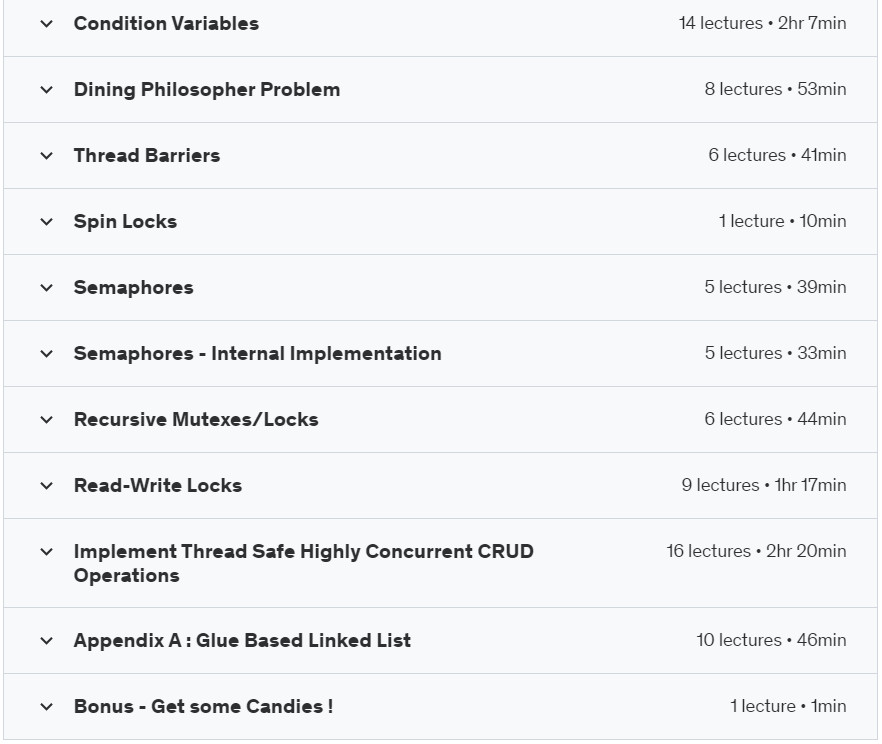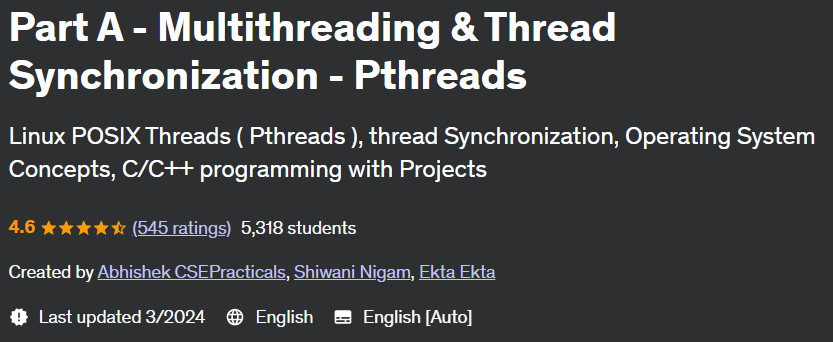Description
Part A course – Multithreading & Thread Synchronization – Pthreads. Welcome to the series of multidisciplinary processing and coordination courses. This course is for those who want to develop basic concepts in multi-threading and related concepts. In this course, we will cover the concepts of multi-threading based on Pthreads (POSIX threads) on the Linux platform. Although we use C to illustrate the concepts, the concepts are suitable for any programming language. This course is equally valuable for C++ programmers. Other language programmers may also find this course useful as we explain multithreading concepts close to zero-base levels without abstraction. We will discuss several concepts involved in multithreading and illustrate each concept through a sample program. Several important concepts include deadlocks, mutual deletion, atomicity, thread synchronization, race conditions, thread branching, and many more. In the next part of this course, we will expand our knowledge of multi-threading to advanced concepts, including small projects in multithreading and thread synchronization. In each step of this series of courses, you will have to write a lot of multithreaded code. So be ready to master Multi-threading. During the trip, we will cover several interview topics and questions to prepare you for the interview. best chance! Table of Contents:
1. Understanding the subjects
- Create and end the topic
- Terms of the competition in the creation of the topic
- Pass the argument to the subject function
- Stack Memory Mgmt for multi-threaded applications
- The timing of the issue
2. Understanding concurrency and parallelism
- Singularity vs Concurrency vs Parallelism
- Concurrent process design – 2 examples
- Threads as a lightweight process
- Overlapping and non-overlapping tasks
3. Connectable and detached subjects
- Joinable Vs Detached Threads
- How to join a topic
- Who should we join?
- Example – map reduction program
4. Interdisciplinary communication
- Understanding function calls and pointers
- The best way to implement ITC
- Implementation of information chains
- A co-publisher model
- How to subscribe/unsubscribe
- How to send notifications to subscribers
5. Asynchronous thread cancellation
- Cancel the topic
- Asynchronous and deferred issue cancellation
- Problem with canceling the Async thread
- Resource leakage
- Variables
- dead ends
- The concept of thread cleanup handlers
- Prevent resource leakage
- Data structure corruption – variables
- Cancellation causes a deadlock
What you will learn in Part A – Multithreading & Thread Synchronization – Pthreads course
-
Basics of MultiThreading
-
Mutual vs. atomic exclusion
-
Thread synchronization techniques
-
Writing secure subject codes
-
Signal and wait
-
Interview questions
This course is suitable for people who
- Graduates and engineering graduates
- Working professionals and job seekers
- Freelancers, system engineers, developers
Course specifications Part A – Multithreading & Thread Synchronization – Pthreads
Course headings
Part A course prerequisites – Multithreading & Thread Synchronization – Pthreads
- C language is MUST
- Linux Operating Systems
- Zeal to learn and excel
- Enthusiasm to write lots of code
Course images
Sample video of the course
Installation guide
After Extract, view with your favorite Player.
English subtitle
Quality: 1080p
download link
File(s) password: www.downloadly.ir
Size
5.7 GB

